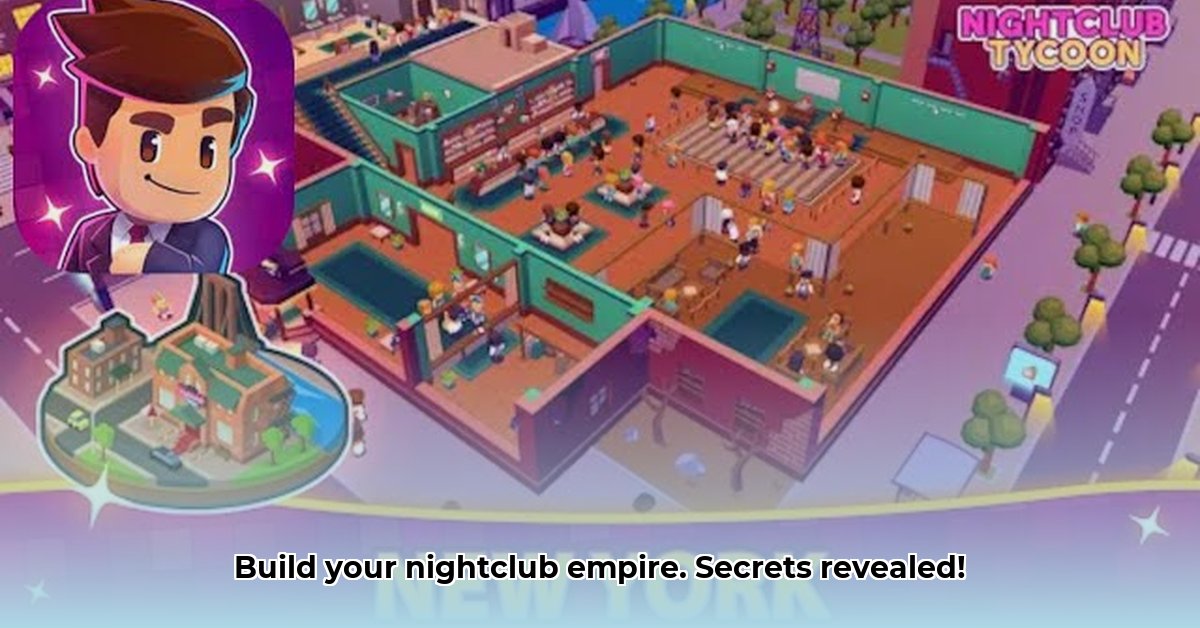
Mastering Mobile Game Monetization: A Comparative Study of Monopoly GO! and Idle Nightclub Tycoon
The mobile gaming market is booming, with developers constantly seeking innovative monetization strategies to capture and retain players. This article analyzes two distinct freemium games, Monopoly GO! and Idle Nightclub Tycoon, to illustrate the diverse approaches to generating revenue and fostering long-term engagement. By comparing their mechanics, we glean valuable insights applicable to game developers and enthusiasts alike. How exactly do these games, with their contrasting gameplay styles, achieve financial success?
Two Paths to Tycoon Status: A Comparative Analysis
Monopoly GO! and Idle Nightclub Tycoon, while both operating within the freemium model, cater to vastly different player preferences. Monopoly GO! prioritizes short, frequent play sessions with immediate gratification. Its quick wins and social features encourage regular engagement and drive in-app purchases (IAPs).
In contrast, Idle Nightclub Tycoon fosters a slower, more strategic gameplay experience. Players cultivate their virtual nightclubs over time, enjoying a sense of accomplishment from gradual progress. This approach leverages passive income and unlocks a long-term engagement loop. Isn't it fascinating how these contrasting styles both successfully generate revenue?
Dissecting the Monetization Mechanics: A Detailed Comparison
The table below provides a side-by-side comparison of the core monetization features and player engagement strategies employed by both games:
| Feature | Monopoly GO! | Idle Nightclub Tycoon |
|---|---|---|
| Monetization Method | Freemium (IAPs, daily rewards, loyalty programs) | Freemium (IAPs, passive income generation, strategic upgrades) |
| Player Engagement Style | Short, frequent sessions; emphasis on social interaction & quick wins | Longer, more strategic sessions; allows for offline progress |
| Reward System | Frequent, immediate rewards; emphasizes instant gratification | Gradual, incremental rewards; fosters long-term progress & satisfaction |
| Core Gameplay Loop | Dice rolling, property acquisition, competitive social elements | Resource management, strategic upgrades, expansion of nightclub empire |
| Target Player Profile | Casual gamers seeking quick entertainment and social interaction | Players enjoying strategic planning and incremental game progression |
The Psychology Behind Spending: Unlocking Player Motivation
Monopoly GO!'s success hinges on the principle of immediate gratification. Frequent rewards and the thrill of quick wins encourage continued play and incentivize further spending. In contrast, Idle Nightclub Tycoon appeals to players who value strategic planning and long-term progression. The sense of accomplishment derived from building a virtual empire fuels engagement and justifies in-game spending. Do these strategies reflect the different player psychologies being targeted?
Actionable Insights for Game Developers: Practical Strategies for Success
The success of Monopoly GO! and Idle Nightclub Tycoon provides valuable lessons for game developers:
For Games Mimicking Monopoly GO!:
- Optimize Daily Rewards: Employ A/B testing to refine reward types and frequency, maximizing player retention without diminishing IAP value.
- Enhance Social Interaction: Implement robust social features to foster a strong community and leverage word-of-mouth referrals.
- Leverage Brand Recognition: If applicable, leverage existing brand recognition for increased visibility and player acquisition.
For Games Resembling Idle Nightclub Tycoon:
- Prioritize User Experience: Create an intuitive and user-friendly interface to minimize frustration and encourage prolonged gameplay.
- Maximize Offline Earnings: Reward players for passive play, sustaining engagement even when they are not actively engaged with the game.
- Implement a Content Roadmap: Continuously introduce refreshing updates—new features, upgrades, and challenges—to ensure lasting engagement.
The Future of Mobile Game Monetization: Adapting to Evolving Trends
The mobile gaming landscape is constantly evolving. Developers must track key performance indicators (KPIs), such as Average Revenue Per User (ARPU), Lifetime Value (LTV), and conversion rates. This data informs strategic adjustments to monetization models and enables proactive responses to market shifts and evolving player preferences. Successful developers will continually adapt, refining their strategies to deliver engaging experiences that players value.
Key Takeaways: Bridging the Gap Between Engagement and Revenue
Both Monopoly GO! and Idle Nightclub Tycoon showcase that effective monetization hinges on understanding and catering to target player demographics and psychology. By carefully crafting game mechanics, reward structures, and engagement strategies tailored to these target audiences, developers can create profitable games that provide lasting value to players. The most successful games will always prioritize player experience alongside revenue generation.
⭐⭐⭐⭐☆ (4.8)
Download via Link 1
Download via Link 2
Last updated: Saturday, May 17, 2025